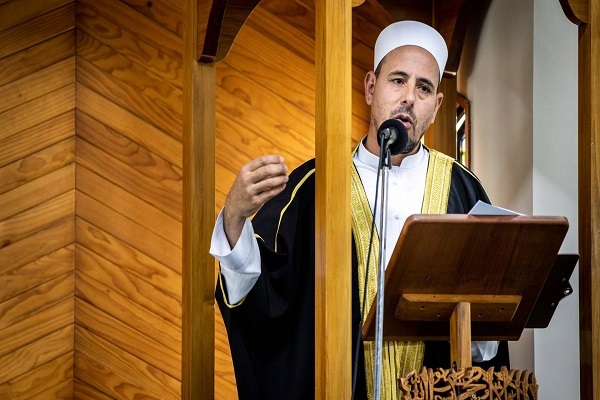Christchurch Mosque Imam Says Saddened by Shocking News of Buffalo Mass Shooting

Gamal Fouda called for social media companies to do more to stop people spreading hate online.
Meanwhile, the co-chair of the Christchurch Call advisory network said the spread of the livestream video of Saturday’s mass shooting in Buffalo, New York was “not even comparable” to the reach of the livestream posted by the March 15 terrorist in 2019.
Anjum Rahman said the spread of the content related to the Buffalo attack was “certainly better” than the March 15 video which was seen four million times in the hours it took to remove it.
There were interactions on Facebook and Twitter alone in the thousands, which was “not even comparable” to the Christchurch attack material viewings.
Acting Chief Censor Rupert Ablett-Hampson announced on Monday morning that the video and the manifesto of a white supremacist shooting more than a dozen mostly-black people in a grocery store in Buffalo, New York, had been banned.
“This footage celebrates the killing of innocent people going about their lives, doing their grocery shopping.”
Having received and examined a copy of the livestream on Monday, Ablett-Hampson said the 6 minute 52 second video of the attack had been classified, on an interim basis, as objectionable under the Films, Videos, and Publications Classification Act 1993 – the same approach was taken for the killer’s written manifesto on Sunday.
The video reached the “objectionable threshold”.
“There is no merit in this, and it is sadly being shared by people who support the actions of the killer.”
As with the manifesto, he urged New Zealanders not to seek the video out, and it would be an offense to possess or distribute them.
In the written publication, banned yesterday, the killer Payton Gendron, 18, says the March 15 Mosque terrorist inspired him to act.
The document outlines his racist and anti-immigrant beliefs, including a desire to drive all people not of European descent from the US.
Gendron shot four people outside the store, three fatally, said Buffalo Police Commissioner Joseph Gramaglia.
Inside the store, a security guard who was a retired Buffalo police officer fired multiple shots, but a bullet that hit the gunman’s bulletproof vest had no effect.
The gunman then killed the guard, the commissioner said, then stalked through the store shooting other victims.
Global Internet Forum to Counter Terrorism (GIFCT), which had been beefed up since the Christchurch attack due to collaboration between countries and companies, quickly activated hashed signatures to identify when the attack appeared online.
But Rahman worried that while content was marked so platforms could remove them, GIFCT had no powers to make those platforms do so.
“We need to start seeing some international consistency...that protect legal rights, but that also provide a way to deal with this stuff when it happens to ensure that it’s not going viral.”
Questions needed to be asked about how platforms planned to prevent content like it being shared in the first place.
Twitch was a product of Amazon, which was a member of GIFCT, so she wanted to know what it was doing to prevent the platform being used in that way.
She believed the shooter used Twitch "for a reason", so it was important to find out why
There might be a case for some platforms accepting content that shared snippets of the manifest to show why it was wrong, for example, but “where do you draw the line?”
There were long-term impacts of terrorism material being available online, she said.
“These people are there, the question is how do we deal with that and what are we doing about it.”
Just taking content down was not enough, and more work was needed on finding out why and how they were radicalized in the first place.
“It’s about protecting communities from violence and young people being radicalized online.”
Her organization, Inclusive Aotearoa Collective Tāhono, was trying to achieve this by investing in a cohesive society.
The Imam of Christchurch’s An-Nur (Al Noor) mosque – where 43 people were slain in the 2019 terror attack – has called for social media companies to do more to stop people spreading hate online.
Gendron published a 180-page racist manifesto heavily referencing the March 15 attack and, like the Christchurch terrorist, tried to livestream the killings.
Fouda said he was “very saddened by the shocking news”.
Family and friends of those killed in the Christchurch terror attack had gathered to remember their loved ones by unveiling a peace rock in Harrington Park in Christchurch when reports of the “heinous” attack in Buffalo began.
“The far-right wing terrorist responsible for the attack used the 15th March terror attack as an inspiration to work out his violent acts,” he said.
“This sends a strong message to all of us that we should care more about one another and work together to tackle the issue of racism in our society,” Fouda said.
“Social media companies must stop people from using them as a platform for spreading hate.”
A March 15 Whānau Trust spokesperson said they were sorry to hear of the Buffalo shooting and send their condolences to everyone affected.
“We are further saddened to hear the attacker referenced 15 March,” the spokesperson said.
The unveiled Peace Rock includes a poem by Sirwan Mohamadi, called Peace, Love and Unity, to remember and inspire hope for a united future.
Fifty-one people were killed in the Christchurch terror attacks of March 15, 2019, at the An-Nur and Linwood mosques. The lone gunman is serving a life prison sentence with no parole.
Source: stuff.co.nz



